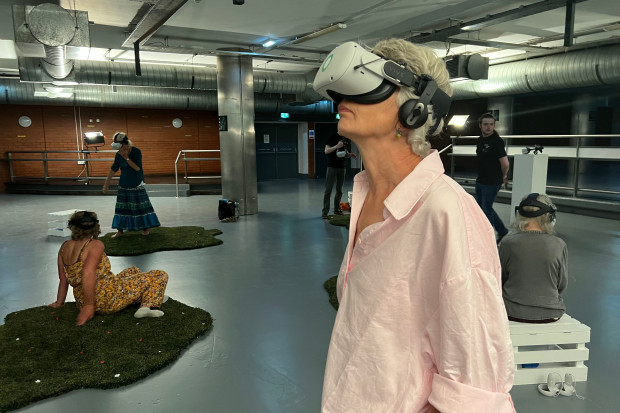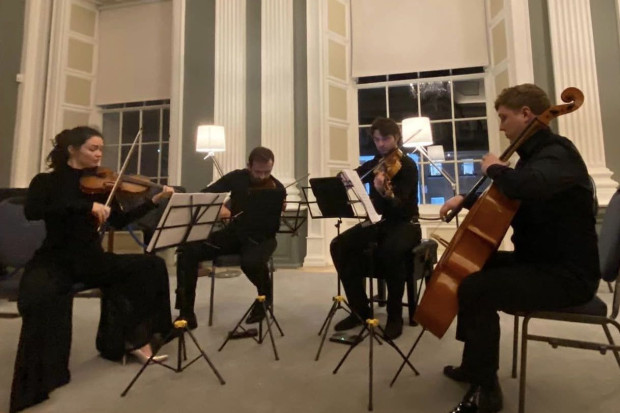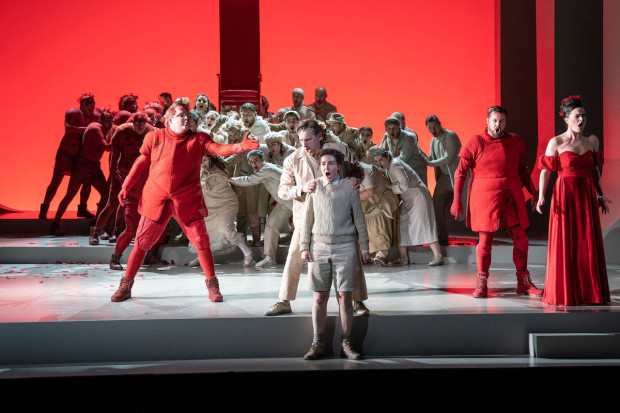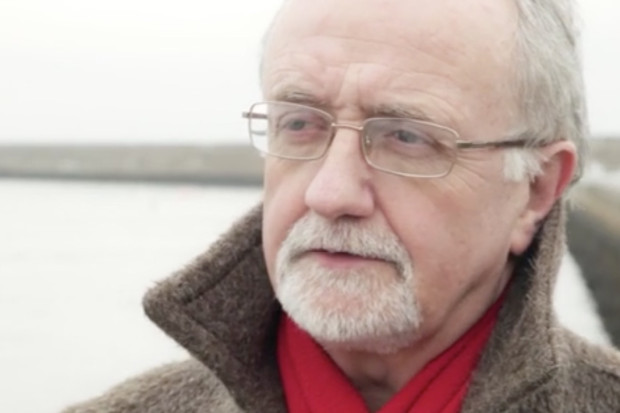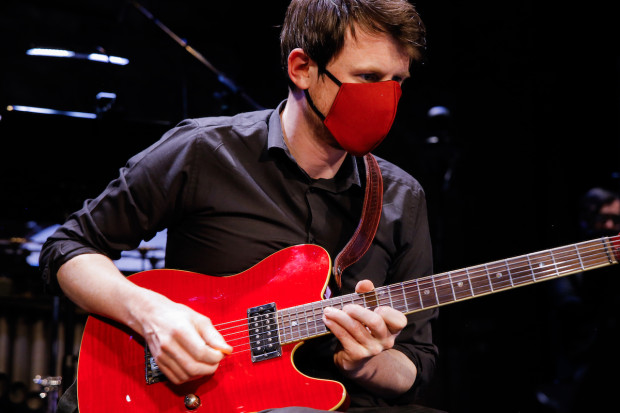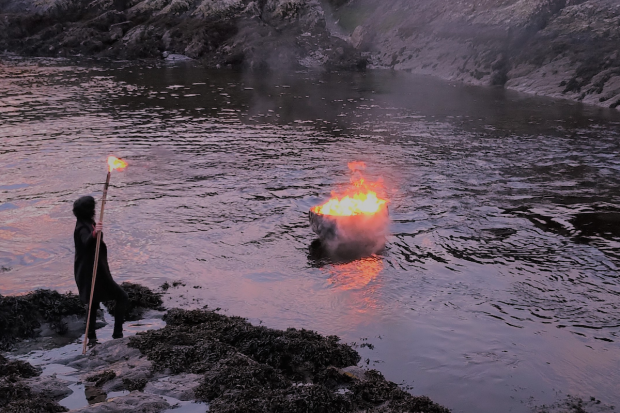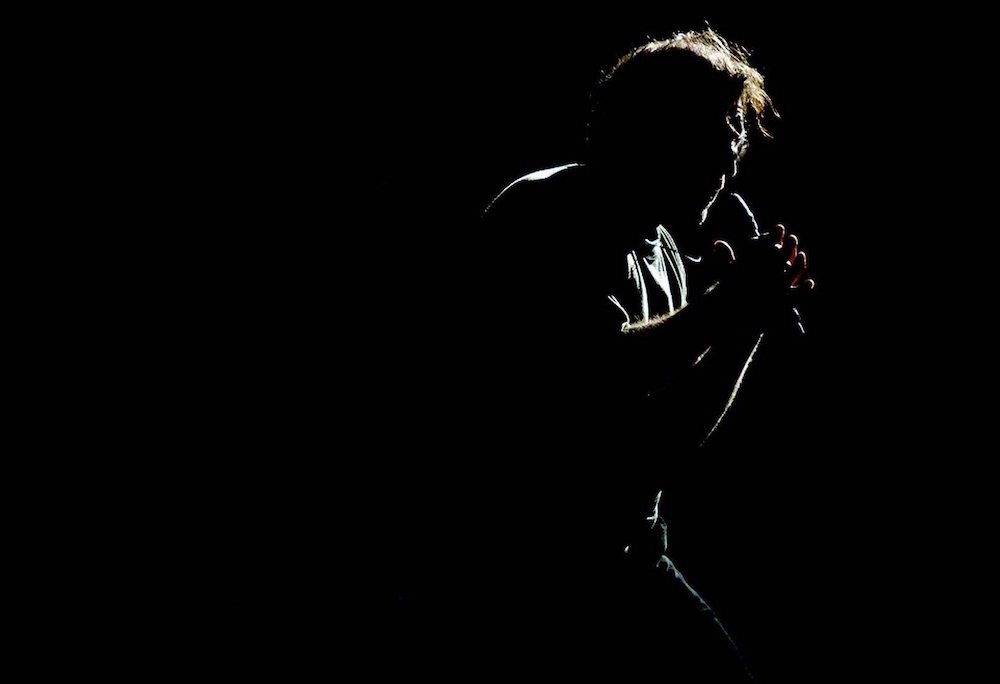
Russian musician Yuri Shevchuk.
Beyond Pussy Riot – Rock, Pop, Rap and the Russian Invasion of Ukraine
Since Russia launched its full-scale invasion of Ukraine five weeks ago, much has been written about the various responses – or lack thereof – by Russian classical musicians who had hitherto been enjoying successful careers in the West. While such statements condemning the war provide reassurances to Western audiences, these are unlikely to have much of an impact back home in Russia where the opinions of domestic popular artists exert a far greater influence on the consciences of ordinary Russians.
In contrast to German heavy metal, French chanson or Korean K-pop, Russian popular music is not well known in the West and has had remarkably few breakthroughs. While many will be familiar with Pussy Riot – the feminist punk rock group that received jail time for their performance protest in a Moscow church in 2012 – this will likely be more due to their political activities than their actual music. Those approaching middle age may recall the teenage pop duo t.A.T.u.’s ‘All the things she said’, which reached No. 1 in several European countries back in 2002, but as far as mainstream success goes, this was the furthest Russian pop music ever got to ‘making it’ in the West.
Within Russia itself, the war has turned the music scene on its head with some figures coming out strongly against the war while others feel compelled to reiterate their support for the regime. Since 4 March – when the government passed two laws criminalising protest and the spreading of ‘fake news’ – any criticism of the war in Russia carries with it penalties of up to 15 year in jail. Throughout its history, however, Russia has always had a tradition of artistic dissent as represented by figures like Tolstoy and Solzhenitsyn who were willing to risk everything to stand up to the abuses of Tsarist and Soviet power.
Are we likely to see figures emerge from amongst Russian popular musicians to continue this tradition of dissent? Or are the risks of incurring the wrath of Putin’s repressive state apparatus too high? It is interesting to look at the responses from prominent Russian musicians to the current crisis within the genres of rock, pop and rap to see who has resisted, who has collaborated and who has simply chosen to stay silent.
Veiled criticisms
Despite existing in almost total isolation behind the iron curtain, rock music in Russia went through it own classic period in the 1980s when bands like Mashina Vremeni (Time Machine), Aquarium, DDT and Kino took advantage of the relative freedoms of Gorbachev’s Perestroika and Glasnost reforms to perform concerts at venues such as the Leningrad Rock Club. For citizens of post-Soviet countries, these bands have a similar type of legendary status that groups like the Rolling Stones or Led Zeppelin have for Western audiences. Because of the inherently subversive nature of rock music within the Soviet system, the lyrics of Russian rock are highly regarded for their poetic allusions that have been frequently interpreted – rightly or wrongly – as veiled criticisms of the Soviet state.
The singer of Aquarium, Boris Grebenshchikov, is often called ‘the Russian Bob Dylan’ and is still very active, continually releasing new material and performing regularly. The eclectic nature of his music as well as his interest in Eastern mysticism, the Russian orthodox tradition, and the high literary quality of his lyrics have meant that he is often regarded as a figure of conscience.
On 25 February, the day after the invasion began, the following statement appeared on Aquarium’s website: ‘This war is madness and the shame of Russia. Aquarium’. The singer himself followed this up on 28 February with a video posted to his Instagram account in which he stated pointedly: ‘The war between Russia and Ukraine is madness. And the people who unleashed it are a disgrace to Russia’.
A few days later, Grebenshchikov posted a video of himself performing his version of Alexander Vertinsky’s anti-war poem ‘What I Need to Say’, which reflects on the tragedy of World War I in a gesture clearly intended to reflect on the current crisis. The lines of the opening verse are as follows:
Ya ne znayu, zachem i komu eto nuzhno,
Kto poslal ikh na smert’ nedrozhavshey rukoy,
Tol’ko tak besposhchadno, tak zlo i nenuzhno
Opustili ikh v Vechnyy Pokoy!I do not know, for what and for whom it is necessary,
Who sent them to their deaths with an unshaking hand,
Just so merciless, so evil and unnecessary
To lower them to Eternal Rest!
Aside from Grebenshchikov, the other veteran of the heady days of the 80s and 90s who keeps writing and performing regularly is Yuri Shevchuk of DDT. The band’s music is a more straightforward brand of hard rock with songs like ‘Rozhdyonnyy v SSSR’ (‘Born in the USSR’) and lighter-waving ballads such as ‘Eto vsyo’ (‘That’s all’). Shevchuk has a long history of anti-war activism having conducted a precarious tour through Chechnya during the first Chechen war where he played concerts to both Chechens and Russian soldiers. He later gave concerts in Moscow and St Petersburg protesting against the Russian-Georgia war in 2008 and famously took on Putin during a televised meeting, criticising the clampdown on press freedoms and the brand of chauvinistic nationalism being propagated by the Kremlin. His song ‘V gostyakh u generala’ (‘As a guest of the General’) satirically mocks the boorish behaviour, hypocrisy and faux-patriotism of a fictive FSB general.
Following the invasion, he posted a photo of a handwritten note on which was written: ‘I, Yuri Shevchuk, and the DDT group are against this war! Peace to the world!’ He also recently released a track entitled ‘Malen’kaya smert’ (‘A Little Death’), which seems to reflect upon the moral deficit in Russian society that allowed this crisis to happen with lines such as ‘The dead ends of the Metropolis hide the darkness / There is no ambulance, no cops, call God?!’ Particularly noteworthy are the final lines of the third verse that, in the present circumstances, are hard not to interpret as a critique of Putin and his circle:
On zhelayet tvoyey smerti sil’ney, chem ty zhit’!
Oni zhelayut nashey smerti sil’ney, chem my zhit’
Oni zhelayut nashey smerti sil’ney, chem my zhit’He wants you dead more than you want to live!
They want our death more than we want to live
They want our death more than we want to live
While both Grebenshchikov and Shevchuk are representatives of the old school, more contemporary Russian rock trends are represented by the female singer Zemfira and the St Petersburg-based group Gruppirovka Leningrad – the latter being by far the most popular rock group in Russia over the past few years.
Zemfira is Russia’s answer to Ireland’s Dolores O’Riordan with a lighter brand of lyrics-driven pop rock. Politically she has been somewhat all over the map, having performed at a summer camp organised by the pro-Kremlin youth movement Nashi (‘Ours’) back in the summer of 2006, a move she later called an error of judgment. In 2015, she unfurled the Ukrainian flag during a concert in Tbilisi, a gesture that was negatively received by certain media commentators in Russia. Perhaps because of this backlash, the following year she aggressively reacted to the presence of a Ukrainian flag being waved amongst the audience at a concert in Vilnius, urging the audience member to put it away.
Nevertheless, the Russian invasion of Ukraine does seem to have clarified her political leanings. Shortly after the invasion began, she left the country and her website displayed the slogan ‘Net Voyne’ (‘No to war’). She also released a video of a song entitled ‘Ne strelyayte’ (‘Don’t shoot’) that she recorded five years ago and which contains scenes from the war in Ukraine and images from the anti-war protests that took place in various Russian cities.
The war has also clarified the politics of Gruppirovka Leningrad whose unique formula of brassy ska-punk combined with satirical lyrics, extensive use of russkiymat (Russian swear words) and slick music videos have earned them enormous popularity. The group’s leader Sergey Shnurov has spent years cultivating a reputation as an outspoken rebel who at times can appear to express popular societal discontent in songs such as ‘Vybory! Vybory! Kandidaty – Pidory!’ (Elections! Elections! Candidates – Faggots!’) or ‘Patriotka’, which seems to mock insincere patriotism.
However, what might appear to a Westerner as oppositional gestures have long been suspected by many Russian critics as being nothing more than the antics of a cynical opportunist designed to maximise the group’s popularity amongst the urban middle classes. True to form, the last month has witnessed Shnurov continue to play the populist card. The first song released by the group in the wake of the invasion was entitled ‘Proshchay, elita!’ (‘Goodbye Elite’) which takes a swipe at the exodus of wealthy Russians leaving the country in order to continue enjoying Western freedoms. More pointedly, on 10 March, Leningrad released another clip entitled ‘No entry for Russians and Dogs’, which plays on some isolated reports – wildly exaggerated by Russian propagandists – that Russian citizens are being hassled or denied services in Europe.
A Russian now is like a Jew in Berlin
Just like in the 1940s
The doctor has a sign in his office
‘No entry for Russians and dogs!’
The preposterous comparison between Jews in Nazi Germany during World War 2 and Russians in Europe is quite typical of Leningrad’s scandalous style, which elevates bad taste and crude generalisation to a stylistic principle.
Occupying the extreme end of the spectrum from Grebenshchikov and Shevchuk are the band Lyube who are rumoured to be Putin’s personal favourite. This is no surprise as they have been singing about Russian grievances since the early 1990s with songs like ‘Ne valyay duraka, Amerika!’(‘Don’t play the fool, America!’), which asks for the return of Alaska – a claim that is made only half in jest. Perhaps more than any other band, their music captures that strain of nostalgia amongst many older Russians for the lost prestige that accompanied the collapse of the Soviet Union and the belief that the chaos of the 1990s was entirely the fault of the West.
The band is a regular fixture at Kremlin organised patriotic events and they were wheeled out again to perform at Putin’s rally at the Luzhniki stadium on 18 March, ostensibly to mark the eight anniversary of the annexation of Crimea but in reality to create the impression that the war is universally supported by all Russians.
A reluctance to take sides
Unlike their rock counterparts, Russian pop musicians have not displayed the same willingness to take sides on the war. One notable exception is the Tajik-Russian singer Manizha whom Western audiences may know due to her performance at last year’s Eurovision with the song ‘Russian Woman’, which attracted a lot of attention for its critiquing of Russian patriarchal gender norms. In her statement condemning the war, the singer underlined the close familial links between the two countries:
There are Ukrainians in my family too. My daughter-in-law is from Ukraine. My future husband is half Ukrainian. My close friends are Ukrainians. Russia and Ukraine are not just two countries. We are family. Any war between us is fratricidal.
On 13 March she released the song ‘Soldier’, a song she originally wrote when she was 19 that appeals to the conscience of the individual soldier.
I never understand thee soldier
You are the brother, son and father,
But now you’re somebody’s toy,
Somebody’s toy, toy, toy.
Manizha’s refusal to remain silent contrasts with many of her more successful (in Russia) peers such as Dmitry Bilan and Arthur Pirozhkov, suggesting that commercial interests trump moral concerns. Fans of Eurovision may recall Bilan from his victory in the 2008 Eurovision in Belgrade and he has crafted a very successful career in Russia ever since with numerous No. 1 hits. Arthur Pirozhkov, whose real name is Aleksandr Revva, is a Russian version of Calvin Harris or David Guetta who pedals extremely catchy summertime dance music with hits such as ‘Alkogolichka’ (‘Alcoholic’) and ‘Zatsepila’ (‘Hooked’). The fact that he hails from Donetsk makes one suspect that he may have divided loyalties.
There is no doubting the loyalty of Oleg Gazmanov, however, who for many years has been the most notorious purveyor of patriotic propaganda music. Stylistically, his music most comfortably fits within the pop genre with cheap sounding backing tracks accompanying the strident lyrics of songs like ‘Forward, Russia’ – a song which featured during his performance at the Luzhniki. Also part of Gazmanov’s set on that occasion was ‘Sdelano v SSSR’ (‘Made in the USSR’), a song whose mere existence is enough to expose the cultural bankruptcy of Putinism. Harking back to the style of 1980s spandex rock – a genre that never really took off in the Soviet Union – the song is remarkable for its fusion of kitsch and jingoistic nationalism combined with a jaw-dropping lack of irony. The song’s opening lyrics are deliberately calculated to rile anyone living in a post-soviet country:
Ukraine and Crimea, Belarus and Moldova – this is my country.
Sakhalin and Kamchatka, the Ural Mountains – this is my country.
Krasnodar Territory, Siberia and the Volga region,
Kazakhstan and the Caucasus and the Baltic States too.
Elevated status of the spoken word
Of all the various genres, Russian rap music has found itself in continual confrontation with the authorities due to the critiques of corruption in the work of rappers like Noize MC and Vasya Oblomov as well as the perceived glorification of drugs and violence in the lyrics of some of its cruder exponents that clash with the conservative ideology promoted by the Kremlin. In a throwback to the old Soviet days, Putin even suggested that the state should ‘take charge’ and control rap after an incident in which the rapper Husky was arrested for holding an impromptu concert on the roof of a car in the southern city of Krasnodar in November 2018 after several of his concerts were cancelled by the authorities for alleged ‘extremism’.
In the hands of its best artists, however, Russian rap music is a highly developed form that takes full advantage of the Russian language’s flexible word order and the innate rhyming possibilities of its grammatical case endings. The elevated status of the spoken word in Russian culture also means that the lyrics of Russian rappers are often highly intellectual and it is notable that some of the most coherent and articulate anti-war statements have emanated from this quarter.
Noize MC, the stage name of Ivan Alekseyev, has perhaps the longest history of political activism having written a rap piece entitled ‘Mercedes S666’ in protest at the death of two women – one of whom was pregnant – after a collision involving the car of the vice-president of the Lukoil oil company Anatoly Barkov, whose car was driving in the wrong lane. In 2015, after the occupation and annexation of Crimea, the rapper also had a number of his concerts interrupted by the authorities in retaliation for his support of Ukraine.
On 23 February, the day before the invasion, the rapper posted a performance of his piece ‘Stoletnyaya voyna’ (‘The 100 Years War’) on Instagram with a lengthy caption that has proved to be extraordinarily prescient:
Any international armed conflict is always inextricably linked with a monstrous distortion of facts: downplaying or exaggerating losses depending on the needs of the moment, silencing war crimes, blurring and shifting responsibility. An attack on another country always has a voiced reason which never coincides with the true reason; at the very heart of this action is always a lie, speculation and the substitution of concepts. When deciding on an attack, the Ministry of Defence always starts a war for peace, and the fact that there are no living corpses, shouldn’t cause anyone to confuse black and white.
Perhaps the most original voice in Russian rap is Miron Yanovich Fyodorov, otherwise known as Oxxxymiron, whose intricate lyrics often include powerful reflections on the struggles of life, and who is considered to be a master of battle rap. On 24 February he released a lengthy monologue on his Instagram where he called for the creation of an anti-war movement in Russia:
When America started the criminal war in Vietnam – which it justified by communist aggression – a powerful anti-war movement was created in America, which united people of very different views – from Muhammad Ali to Bob Dylan. Naturally, the American government then tried to expose this movement as anti-patriotic but today we know that history has very clearly shown to everybody that the truth was behind this movement. It changed the attitude of American society to wars and of course, we need such a movement now.
Immediately after the invasion was announced, the rapper cancelled six sold-out shows in St Petersburg and Moscow, explaining to his fans that it was impossible to perform when ‘Russian missiles are falling on Ukraine – when residents of Kyiv are forced to hide in basements and in the metro, while people are dying’. He has since organised a series of concerts entitled ‘Russians Against War’ that have already taken place in Istanbul and London with all proceeds being donated to a non-governmental charity organisation helping the children of Ukrainian refugees.
Unlike his highly cerebral peers, the controversial rapper Morgenstern is more known for referencing money, drugs and violence in his lyrics. Nevertheless, his most recent release entitled ‘12’ begins with a sample of an interview that the Ukrainian journalist Dmitry Gordon gave on the Russian news channel Dohzd (who have since stopped broadcasting) in which he told Russian soldiers to get out of his country using a series of expletives. The clip ends with Morgenstern and another musician Vladislav Palagin with whom he frequently collaborates, listening to a voice message from a woman:
My dear son, well, yes, here, right here, in the morning the roof was almost blown away. We thought about running somewhere, and then returned to our house. Right now we are sitting in the cellar, we have prepared a bomb shelter for ourselves. So, well, oh baby, don’t worry.
A caption informs the listener that this is the voice of Palagin’s mother. Palagin is a Ukrainian musician with whom Morgenstern works and the clip ends with the words, ‘He is Ukrainian, I am Russian. We make music together. We want peace. We want friendship.’
Not all Russian rappers find themselves at odds with the Kremlin. Moscow rapper Timati Yunusov, known simply by his first name Timati, has long been a Putin supporter. In 2019, the rapper released a track dedicated to his home city on the eve of the Moscow local city elections and simultaneously managed to set the record for the most disliked Russian video ever to appear on YouTube amassing 1.48 million dislikes. The piece includes lines like ‘I don’t go to protests and I don’t talk shit’ and boasted that Moscow is ‘that same city which doesn’t hold gay parades’. Timati was also one of the artists performing at the rally at the Luzhniki stadium where he ended his performance with a short speech:
You know, there was never a moment in my life in which I was ashamed to say that I am a citizen of Russia. I think that it is those from other countries who should be ashamed. I was born in this country. I love it with all my heart and I honestly think that we are the best country in the world. Who would say otherwise?
An anti-war movement?
So will all these gestures make any difference? At this point the possibility of realising Oxxxymiron’s vision of a broad anti-war coalition is hard to envisage. The reality is that the war in Ukraine either has the support or the acquiescence of large swathes of the Russian population who have been subjected to years of propaganda via state television and radio. Although the invasion of Ukraine took most people by surprise, when one listens back to the songs of Gazmanov and Lyube, it’s hard not to conclude that the path to this point had been paved in advance.
One development that does seem to be reemerging is the tradition of Russian political and artistic figures in exile. Everyone from Alexander Herzen in the nineteenth century to Lenin at the beginning of the twentieth to Solzhenitsyn towards the end of the last century, served their time in the West. Many of the artists who spoke out against the war have since left the country and are unlikely to return anytime soon. This will grant them the freedom to speak out but such is the extent of anti-Western feeling fomented by the government in contemporary Russia that exile is liable to be seen as betrayal rather than defiance. It also does not help that the likes of Shnurov and Leningrad have seized on the opportunity to exploit popular resentment against Russian citizens who have chosen to emigrate, pitting them against the ordinary people who do not have the means to do so.
One figure who has chosen to stay is Yuri Shevchuk. When asked by a journalist whether or not he was contemplating leaving Russia, Shevchuk replied:
Go to Israel? What for? First of all, I’m not Jewish. But joking aside, I will resist, even if I am kicked out of the country. Because, damn it… I love my homeland. For me, my homeland is not the government, but good ordinary people… trees… I can kiss birches for days, like Sergei Yesenin [a lyrical poet], and write heartbreaking poems. My motherland – it’s a grandmother who does not have enough change to pay for sausages in the store. This is my Homeland.
Shevchuk’s Tolstoyan vision of his homeland could not be more at odds with the nationalistic revanchism emanating from the Kremlin. The next few years will determine which of these visions will win out and Russia’s artists will be at the forefront of this struggle – on both sides.
Published on 1 April 2022
Adrian Smith is Lecturer in Musicology at TU Dublin Conservatoire.










